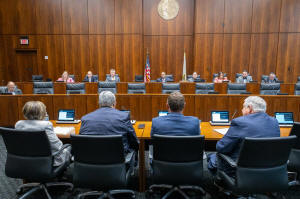Transit heads again ask state for funding help, reject proposals for
oversight reform
 Send a link to a friend
Send a link to a friend
[July 11, 2024]
By ANDREW ADAMS
Capitol News Illinois
aadams@capitolnewsillinois.com
 CHICAGO – It was standing room only in a downtown Chicago committee
hearing Tuesday as activists, transit experts and lobbyists hung on the
words of the region’s transit agency chiefs. CHICAGO – It was standing room only in a downtown Chicago committee
hearing Tuesday as activists, transit experts and lobbyists hung on the
words of the region’s transit agency chiefs.
Public transit has become an increasingly contentious issue in
Chicagoland as the Regional Transportation Authority – the funding body
which oversees Pace suburban bus routes, Metra regional rail lines and
the Chicago Transit Authority – has reported a looming “fiscal cliff” in
2026.
While the agencies are currently buoyed by pandemic-era funding and
temporary allowances in state law, the agencies will face a cumulative
annual budget gap of $730 million in operating costs beginning in 2026,
according to the Chicago Metropolitan Agency for Planning.
“The preliminary analysis from our consultant shows that the fiscal
cliff scenario, without state funding assistance, could wipe out 30 to
40 percent of the service in northeastern Illinois,” RTA Board Chair
Kirk Dillard, a former state senator, said in Tuesday’s hearing.
Under that worst-case projection, the fiscal cliff would cause a $2.4
billion drop in regional GDP in the first year and impact up to 25,000
jobs. But Dillard painted a much rosier picture if the state increases
its annual support for the transit agencies: $2.5 billion annual growth
in GDP and the addition of 27,000 new jobs.
“You’ve got a choice to make,” he told lawmakers Tuesday.
But some lawmakers in the General Assembly are unwilling to give carte
blanche to the transit agencies, which have been criticized for service
cuts, safety issues and poor workforce development since the early days
of the pandemic.

Sen. Ram Villivalam, D-Chicago, the chair of the Senate Transportation
Committee, called Tuesday’s hearing – the first in what will be a series
meant to investigate possible improvements to public transit in
Illinois.
He said there will be “no votes for funding” unless the general assembly
and transit board first address service issues and governance reforms.
Earlier this year, Villivalam proposed legislation that would
consolidate the four agencies into one organization.
This was in line with recommendations that the Chicago Metropolitan
Agency for Planning, or CMAP, pitched to Villivalam and other lawmakers
late last year. These recommendations were given further credence in
April when the Civic Federation, an influential Chicago think tank,
proposed similar reforms.
Both proposals provided options for either combining the four agencies
or giving the RTA, or a new oversight agency, more authority to control
regional transit policy.
But the heads of the Chicagoland agencies balked at the idea of major
reforms on Tuesday.
“We all want to do the best job we can,” Pace Executive Director Melinda
Metzger told the committee. “I do not believe that combining us into one
organization will make us better.”
Metzger said each agency has a board that includes local representation
and that she believed “the needs of suburban areas will not be met as
well as they’re met right now” if governed by a single agency.

[to top of second column]
|

Pictured left to right, Pace Executive Director Melinda Metzger,
Chicago Transit Authority President Dorval Carter, Metra CEO James
Derwinski and Regional Transportation Authority Board Chair Kirk
Dillard, face the Senate Transportation Committee during a hearing
that turned into a forum on calls for reform at the agencies.
(Capitol News Illinois photo by Andrew Adams)

CTA President Dorval Carter also defended the current system.
“The model that’s been set up for governance today didn't come by by
accident,” Carter said. “It was a really hardly negotiated compromise
between the need for accountability and the need for local control.”
Metra CEO James Derwinski also noted that many of the improvements that
transit advocates seek are a funding issue, not an oversight one.
“If we adequately fund the system, the operators can do the right
things,” he said.
Representatives of business groups spoke to lawmakers about transit’s
economic impact, but they also mostly discussed the need for reform.
Jack Lavin, head of the Chicagoland Chamber of Commerce, echoed
Villivalam’s call to improve service and governance before providing
agencies with new revenues. He urged caution around potentially
increasing taxes and called sales tax increases and congestion taxes
“job and growth killers.”
Sen. Don DeWitte, R-St. Charles, the committee’s Republican spokesperson
and former RTA board member, said he agreed with Lavin’s comments around
taxes.
“I think we need to be very careful about putting additional burdens on
taxpayers or riders within the RTA system,” DeWitte said.
But DeWitte also noted he hopes to further explore the idea of
increasing state or federal funding, noting that the state contributes
17 percent of RTA’s revenues, while other states contribute
significantly more to large transit systems. Philadelphia’s transit
system gets half of its funding from the state of Pennsylvania,
according to a CMAP analysis cited by DeWitte during discussion.
“That’s an area that I think we are woefully shy on,” DeWitte said.
Transit advocates also spoke to the need for governance reform. Micheál
Podgers, a policy lead with the transit advocacy organization Better
Streets Chicago, said he wasn’t surprised by the agency heads’ lack of
enthusiasm for reform.

“I will say, though, I was heartened to hear that, overall, it seems
they’re in favor of increasing investment in transit, even though
certainly some of the more conservative speakers and conservative
members of the Senate were a little bit tentative on increasing taxes,”
Podgers said.
Tuesday’s hearing will be followed up with five additional hearings
around Chicagoland and in Springfield in the coming weeks. The hearings,
according to Villivalam, will inform some kind of proposal by lawmakers’
spring session next year.
“We definitely need to take action, I think, at least 9 to 12 months
before the fiscal cliff of early 2026,” he told Capitol News Illinois.
Capitol News Illinois is
a nonprofit, nonpartisan news service covering state government. It is
distributed to hundreds of print and broadcast outlets statewide. It is
funded primarily by the Illinois Press Foundation and the Robert R.
McCormick Foundation, along with major contributions from the Illinois
Broadcasters Foundation and Southern Illinois Editorial Association. |